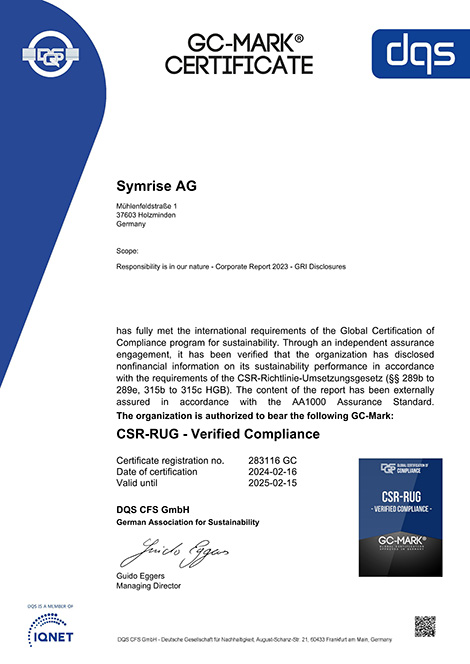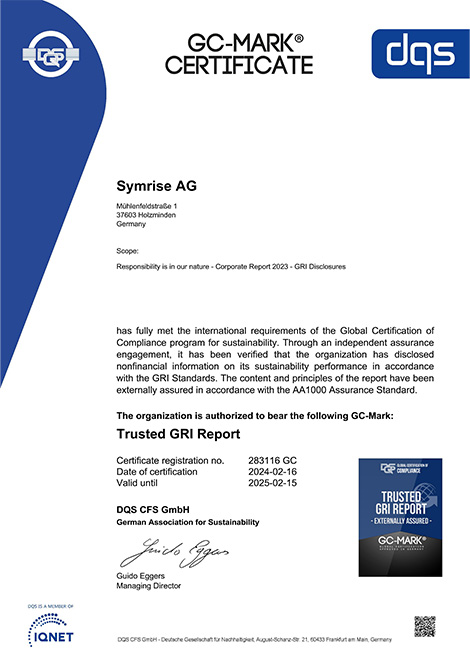We use cookies to provide you with the best possible experience. They also allow us to analyze user behavior in order to constantly improve the website for you. Privacy Policy

Publications on
sustainability
In our sustainability reporting, we comply with the 2021 GRI Standards version of the Global Reporting Initiative (GRI) guidelines, including all updates from previous years.
A s an active member of the Global Compact, we adhere to its universal principles for responsible corporate management as well as to the Sustainable Development Goals (SDGs) of the United Nations. We actively contribute to achieving them along our entire value chain, from the generation of raw materials and product development to our customer relationships.
We act sustainably throughout these stages of the value creation process and with regard to our material topics. This chapter focuses on the four topics for which we bear particular responsibility and on which we have signifi cant infl uence. Sustainable partnerships and dialogue with our employees and stakeholders are our main starting point and our motivation. With this in mind, the following pages present the perspectives of several of our internal dialogue partners on the topics identifi ed by means of a materiality analysis and the biggest challenges associated with them.
We have integrated all quantitative and qualitative transparency information, our strategic approach and the management concepts of our material topics into our Sustainability Record in accordance with the GRI and thus meet the requirements of the CSR Directive Implementation Law (CSR-RUG) pursuant to Section 289b (3) of the German Commercial Code (HGB). All information has been externally audited in accordance with the AA1000 Assurance Standard.

Focus Corporate Report
- Integrated corporate strategy
- Central nonfinancial management key figures
- An overview of sustainability management
- Focus on key topics and Sustainable Development Goals (SDGs)
- Sustainability rankings and ratings
Available at:
Corporate Report

Focus GRI Sustainability Record
- All key figures and information are in accordance with the GRI standards
- Nonfinancial report pursuant to Section 289b (3) of the German Commercial Code (HGB)
- Progress report for the Global Compact
- SFDR Index with Principal Adverse Impact indicators
- TCFD Index with references in the CDP questionnaire
- SASB Index on reporting requirements covered
- Explanation of the EU taxonomy
Available at:
GRI Sustainability Record 2023The complete Symrise CDP Questionnaire 2023 is also available on our website. All Symrise policies can also be downloaded there.
Our CDP ReportingNew Partnerships in 2023
The following new initiatives, commitments and collaborative alliances were joined and signed:
- Renewable Carbon Initiative
- Low Carbon Transition Project
- ProSpecieRara
Transition of the wording from “climate positive” to “net zero”
The term “climate positive” is no longer appropriate in the current context of technical discussions, regulatory developments and other standards (German Climate Protection Act, ISO 14068, SBTi, legal definitions relating to the Paris Climate Agreement, EU Green Claims Directive, EU CSRD). The aforementioned laws and standards use the terms “net zero” or “greenhouse gas neutrality” (GHG neutrality).
In order to ensure the highest possible degree of congruence with the terms used in the regulations, the term“climate positive” will be replaced by the term “net zero” in Symrise’s future external communications. However, this will have no impact on the global implementation of Symrise AG’s integrated climate strategy and, in particular, the planned activities to reduce greenhouse gas emissions.
According to the above-mentioned regulatory developments and other common standards, the term “climate positive” implies a net negative GHG balance, taking into account all of the company’s activities.
The term “net zero” refers to the net emissions of an organization, which are calculated by subtracting the greenhouse gas reductions or removals from the atmosphere from the greenhouse gas emissions in the GHG balance. Furthermore, this term only includes greenhouse gases that are defined as such in the UN framework. It is also the basis for important initiatives such as the Science Based Target initiative and global industry standards such as ISO.
According to the current state of discussion, “positivity” cannot be achieved, or can only be achieved at high cost. The desired state is a balanced greenhouse gas balance of remaining (residual) emissions and offsetting or other compensation measures, which can be described as “net zero.”